Why do some Upwork freelancers land client after client while others are stuck sending just as many proposals with nothing to show for it?
In this article, we’ll look at winning Upwork proposal samples but first I have to point out something else.
Through an experiment, I found that just about 55% of the projects I applied for never hired ANYONE. That means that more than half of the projects were closed without a match.
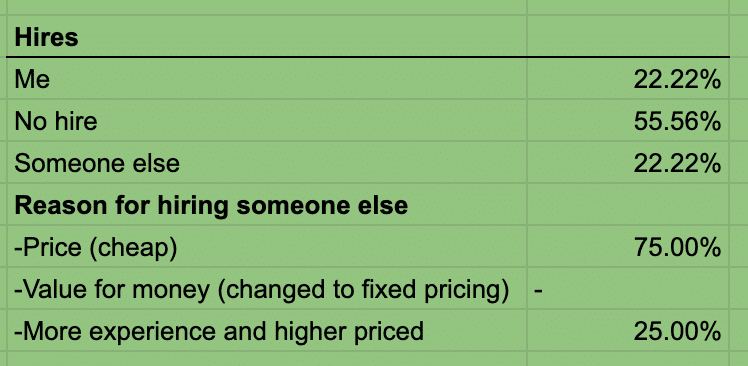
If you’ve had challenges landing new clients on Upwork, it could be due to a bad Upwork proposal but it could also be because of flaky clients.
I’ve captured some of the bad Upwork proposal samples I’ve received as a client and in this article, you and I will be looking at two of the most common mistakes.. just avoiding these two will make a difference!
We’ll also dive into reader examples of Upwork proposals that landed projects, why they worked, and how we can land projects by using the right Upwork proposal template.
Let’s get crackin’, shall we?
Your Upwork proposals might be fine. The jobs you’re applying to aren’t.
Over 55% of Upwork jobs never hire anyone — not you, not the cheaper freelancer, nobody. You’re spending connects on clients who were never going to hire in the first place.
There’s a better way to find jobs worth applying to.
[Show me →]
How NOT to write an Upwork proposal: little-known mistakes that scream “don’t hire me!”
As a client hiring on Upwork, I often read one time-wasting proposal after the other.
It’s comments like “I understand the quality of content matters to you” for a copywriting project that makes me want to bang my head against the wall.
No shit, Sherlock.
It’s a painful experience to receive proposal templates with someone claiming that they read the project description when their proposal screams that they didn’t.
If a client only receives one of those every now and then, they might not think much of it but when 90% of them sound the same, it’s impossible to tell them apart. Just have a look at these examples:
Samples of a bad Upwork proposals
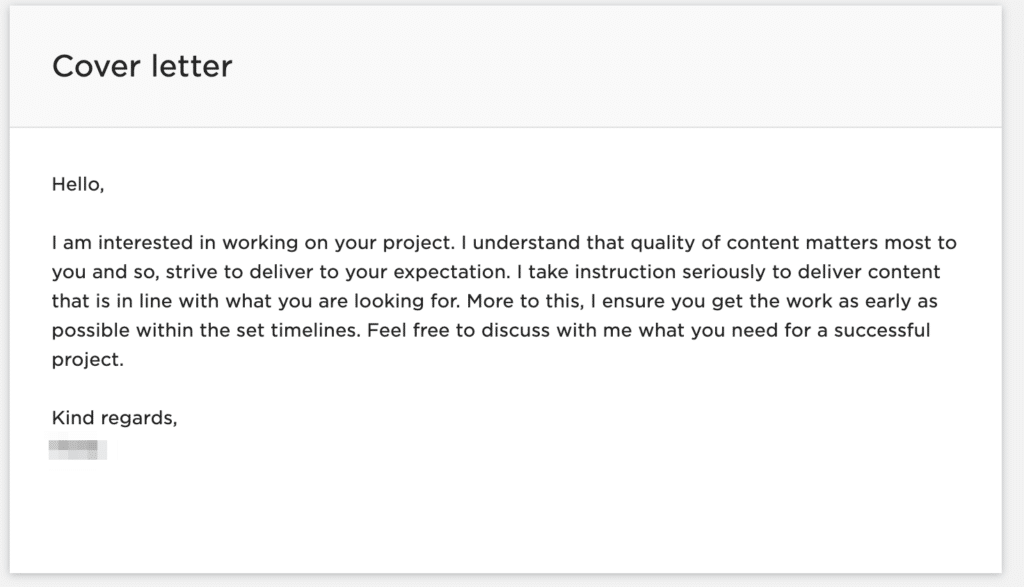

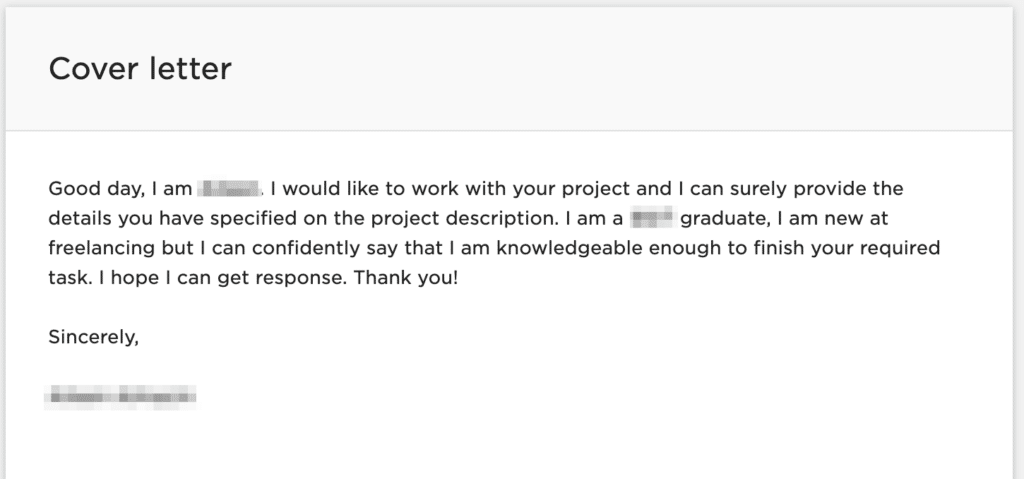
What do you notice in these examples?
They SCREAM “me, me, me!” and most of the sentences in all three examples start with “I”.
They are invisibly asking the client to spend their limited time figuring out how theirs is different from the other and how any of the points relate to the project.
As a client, it feels like there’s going to be a lot of extra work and hand-holding, and then I might as well do it myself.
Many clients have plenty of freelancers throwing themselves at their projects like it’s a 3 AM meat market at a popular nightclub.
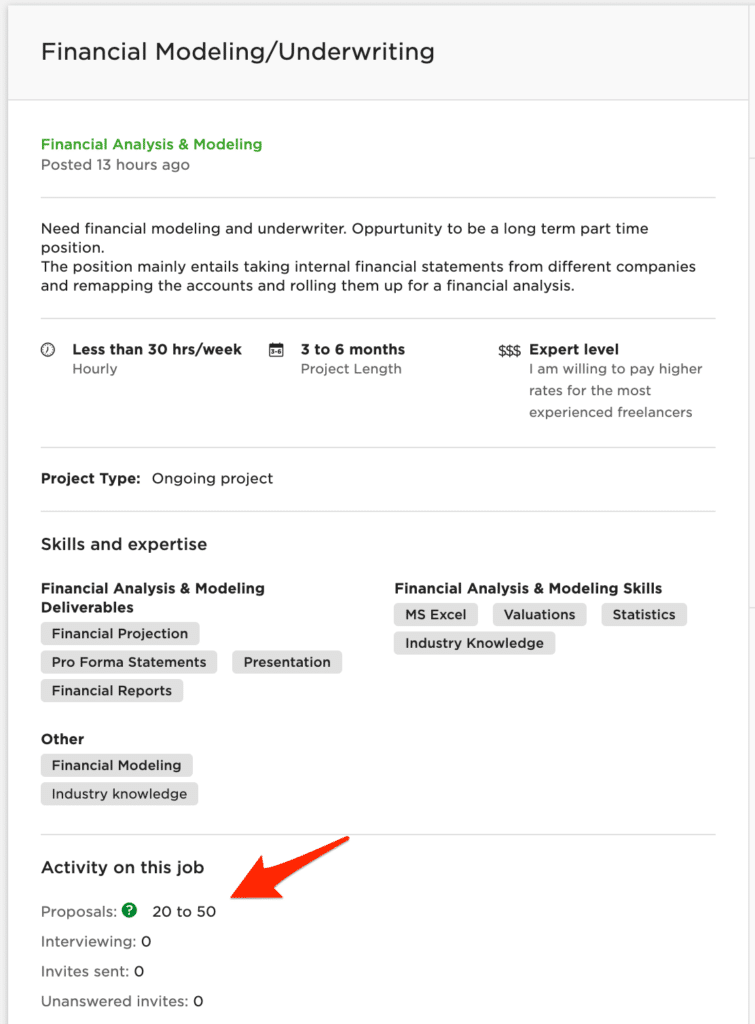
Most clients are not looking for anyone with relevant skills. They are looking for the right fit.
If we don’t consider the client’s situation, we’ll lose out on the project. Almost everyone cares about themselves first and that is also true for our potential clients.
They only care about us in as much as it helps THEM and because we know that, we can use it to our advantage.
We often see long lists of “tips” to write Upwork proposals:
- Be professional
- Take tests
- Have a portfolio
While the tips might be on point, the challenge they give us is that they focus on too many things that aren’t going to move the needle for you and it’s impossible to know where to start among the 147 vague ideas.
Instead, let’s make things more actionable and focus on just avoiding two of the biggies:
Mistake #1: Going for a 5-course meal instead of drinks on the first “date”.
When we assume that what Upwork calls a “proposal” is a proposal in the traditional sense, we risk losing out on projects by moving forward too fast.
Granted, for smaller, projects like research or data entry projects, sending a proposal and hiring right away works just fine.
They are great projects to get our feet wet but we are unlikely to earn anything with a serious impact in our lives over the long haul.
On the other hand, imagine a complex marketing project with ads, partnerships, and research or building a mobile app from scratch without a deeper discussion of expectations and goals.
It is a disaster in the making. It is unlikely that both the freelancer and client are on the same page right from the get-go. Inevitably, they will disagree on something during the project.
So, when we hit the client with a proposal screaming “hire me now”, it can go one of two ways: either it will end in a disaster down the line or the client will think that we aren’t a serious partner if we haven’t considered all the little details.
The client doesn’t know anything about us and they only have our proposal to make up the first impression by. If they aren’t too busy, they might look at our profile and portfolio. Maybe.
Many businesses use a proposal as a summary document to get the specific deal on the table in writing when they have all the project details and have ALREADY discussed it with the freelancer.
If that was offline, we wouldn’t go meet the client and bring a proposal right away either. Instead, we’ll ask them for more details to better understand their expectations and requirements.
That’s what we need to do on Upwork, too. Conveying complex topics is difficult enough as it is, so it is important to make sure we are on the same page as the client.
In a relationship-based business like freelancing, the invisible currency is trust and we benefit from getting the potential client to feel like they can trust us first.
Mistake #2: Mistaking the matchmaking process between freelancer and client for being logic based.
Clients don’t tally up all the results and case studies among freelancers, give points and hire the winner.
It’s not a logical process, it’s emotional.
Clients like to feel that we are taking care of them, hugging them, and not running away all of a sudden so they are stuck if something didn’t go as planned.
Now that we know clients hire with emotions and that it is important for us to understand them and their project before offering the deal, let’s dive into a couple of reader examples that landed clients.
That way, we can understand what works and then finally, how we can turn that into proposal templates.
Upwork proposal samples that won projects
Let’s look at two examples from readers who landed real projects on Upwork.
Project description:
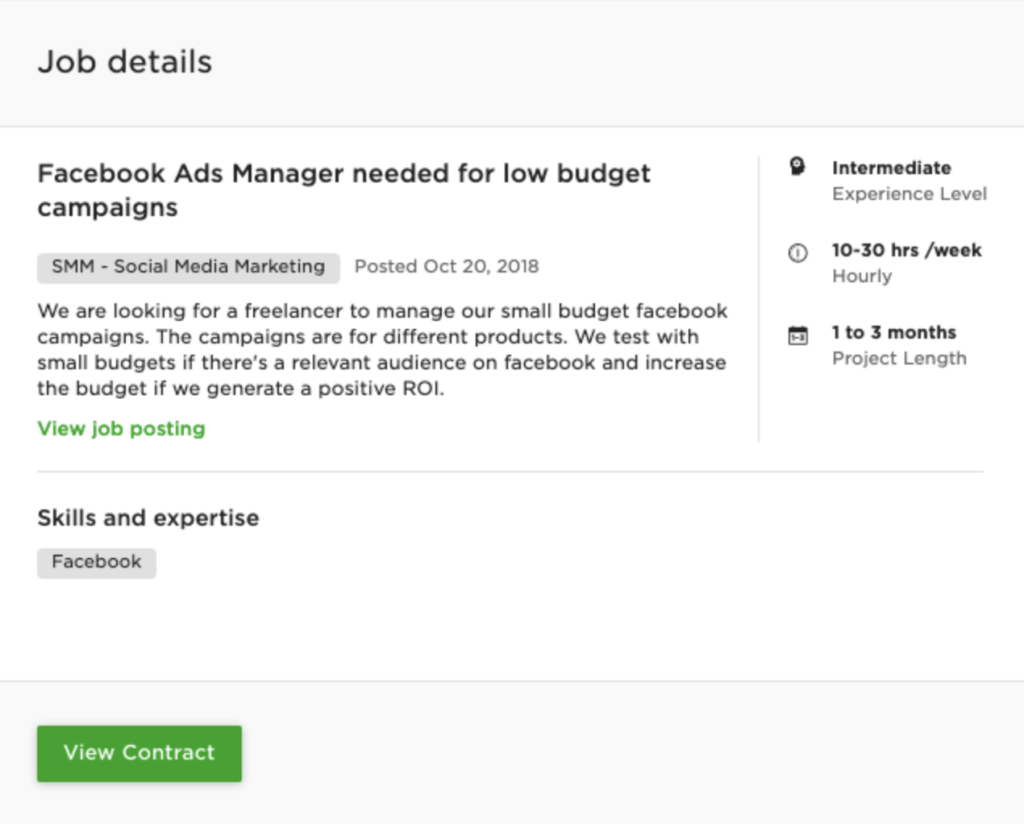
The cover letter:

He landed the gig at $35 an hour.
By sharing his expertise in relation to the project, this freelancer is able to show that he needs more information to do a good job.
A tempting mistake is to overdo this by writing a hundred pages. The client will feel overwhelmed and never finish reading it. Instead, this freelancer is giving a “taster” and is opening up for a deeper conversation by point out things that the client might not have considered yet.
It has a terrific side-effect: you’ll see a number of trigger-happy clients that haven’t thought their project through, and they will either dive deeper with you or avoid you altogether.
Both avoid a major headache for you down the line. Disaster averted.
:format(png)/cdn.vox-cdn.com/uploads/chorus_image/image/37308548/Frank-Grimes-saves-Homer.0.0.png)
We, humans, are suckers for predictability and by showing his expertise, this freelancer helps the client feel like they get to know him a little bit better.
Study shows that we prefer things we know — even if that freelance isn’t amazing — over things we don’t.
That’s why the concept of a brand works. People feel like they know how it will behave in the future and that earns trust. It might not be good trust but it is comforting for us to know how something will pan out in advance.
Think about a brand like McDonald’s. Many of us dislike their food but they have proven that their customers sometimes just want something familiar. They serve millions upon millions.
Here’s another example. The project description:

And the proposal:

The reader won the project at a $250 flat rate.
It’s great that the freelancer used the client’s name but the opening sentence is generic and fluffy.
Instead, he could have shown a specific project where the use of strategy and content was obvious. The middle section does that and could have been used as the opener.
The first line in the job description says “I’m looking for a writer who can take my concepts and write an article, and then put it into MailChimp for my e-letters and also on my wordpress blog.”
It would make sense to focus specifically on that process when sharing previous projects.
For example by showing “my client preferred to share a keyword, angle, and basic outline and I would suggest an in-depth outline for approval before writing the content to make sure the direction was on point. If you’d like, I can check in with you daily in the beginning, and when you like the work we could switch e.g. to weekly check-ins if you prefer. That way, we can work out any potential kinks quickly and put together a process that works the best for your business schedule.”
The same goes for the email- and web strategy. If we have no experience, we can instead explain how we would go about it and suggest comparing notes with the client.
What do you notice in these two examples?
The project descriptions are not that specific which makes it hard to write something great.
The proposals point this out by noting that there is some information that they don’t have so they can’t send the perfect proposal. And instead of shrugging and thinking “I might as well give up”, they show SPECIFIC examples.
Examples that might fit into the client’s situation and give enough details for the client to get an understanding of their expertise but most importantly show interest and commitment to them by doing a lot of the work upfront.
I’ve noticed that by making a great first impression, we can put ourselves in a different “bucket” of freelancers.
A bucket that commands more money. Some clients actually want to pay for awesomeness but the problem is that most clients have never worked with someone really great before. So it is our job to show them what that looks like.
[convertkit form=2588400]How to create a winning Upwork proposal template
So how do we create something better?
Everyone likes to say “it’s a number’s game” and they are right. But it’s a different numbers game.
They are neglecting that the challenge with sending many proposals and getting no results is that you’ll feel bad because you worked a lot with nothing to show for it.
Instead, we’ll send fewer that are more specific.
My approach is to first create proposals that win projects, then learn how to do it faster.
Not both at once!
The first step to writing a good proposal is to have a good project description to write it for.
You have to write something PERSONAL for the potential client. And since it’s personal, you also need some specific information to write from.
This is a great example of a project description that is difficult to write a great proposal for, so you’ve lost before you even begin. The only thing it has going for it is that it mentions that it should be about nails.
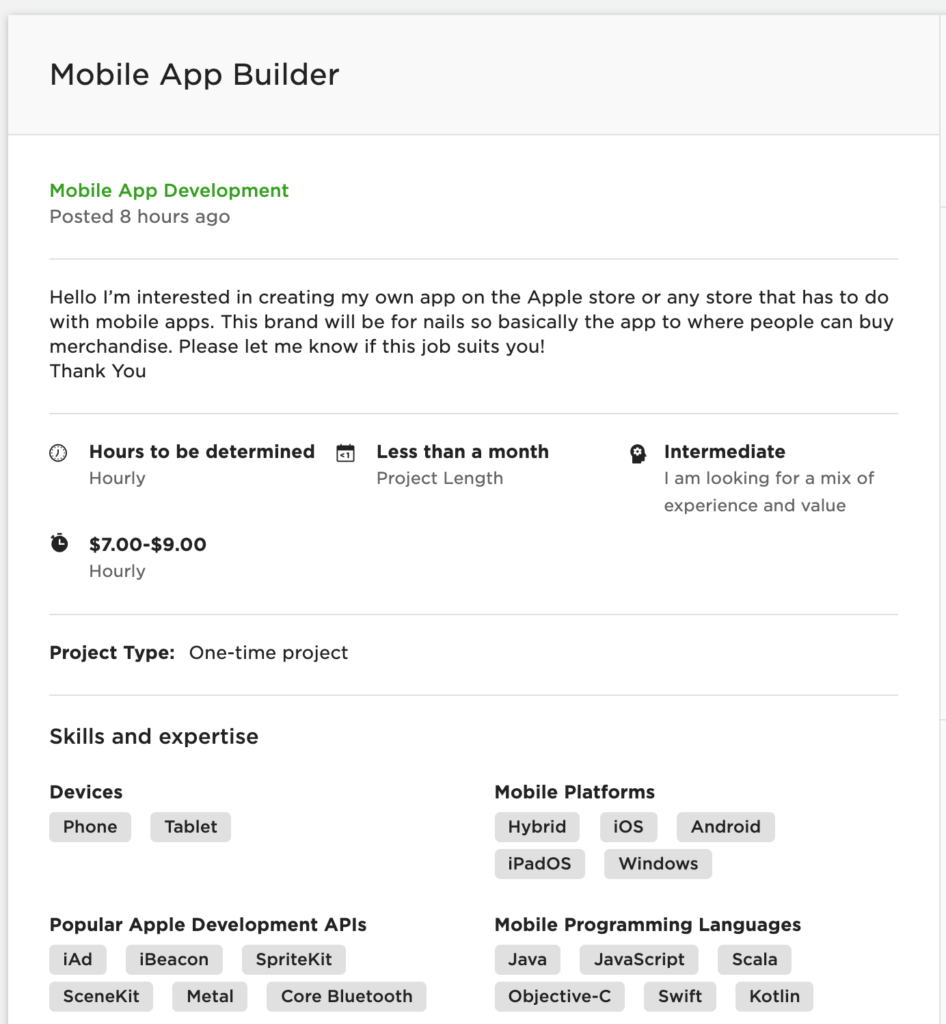
Compare that to the project description below:

While it isn’t an amazing project description, it gives us something to go after because the owner has given some specifics like the time period and specific items she’d like help looking at.
The rule of thumb is that if you feel like you can write something that is personal and not easy to copy-paste based on the job description, you are good to go.
Understanding the client is our number one priority if we want to land the project. By focusing on their problem and getting to know them BEFORE diving into the solution, we can make them feel that we care about them. That makes all the difference.
We can show examples of solutions like we saw above but the client often won’t say “cool, let’s start” right away. The proposal is just a way to pass the initial test, so they can see if we are worth talking to.
Remember that our potential client might not know all the facts about their own projects — he doesn’t know what he doesn’t know. That’s what we have to help him figure out or at least figure out if he does.
I’ve found that the more we speak with clients, the more we move from the box of being an unknown freelancer into the box of at least being someone they are familiar with.
To be able to find projects with specific info, I like to search projects that share things like URLs (e.g. .com, .net, etc.) but it could also be names or other details that fit your line of work.
Once you have a project you like, the goal is to get the client to write back and schedule a phone call, not land the project! That comes later.
I like to write proposals with three “sections”:
Section 1: This is the first couple of lines and the purpose is to get the client to open the proposal and start reading. That’s it!
I like to do that by… you guessed it! Making it personal.
I’ll include their name if I can (find it in their reviews) and write a line or two about my personal interest in the topic, a specific experience I’ve had, or a nice comment if I can find something relevant. Kinda like small talk if it was offline.
Section 2: here I like to share my expertise, experience, or how I would go about their project (e.g. the process I’ve found most helpful).
The key is to spend time thinking about what the client’s business goal is and show HOW the project or process helps with that. Make it obvious for them, don’t let them guess it.
For example: if you are a video editor, they might want more engagement on their site, so show them how videos can drive more comments. You should have a good idea about the goals your type of client is after. Sometimes you’ll get lucky and they write it in the project description but don’t count on it.
Section 3: In the last section, I like to share relevant attachments like screenshots from previous projects that are RELEVANT!
Not my entire portfolio so the client has to dig through it and figure out what is relevant. They are busy so do it for them.
I also like to finish with ONE question. Often, I’ll ask when we can get on a call so I can learn more about their business and feel out if they’ll be nice to work with.
That was step number one in writing proposals that’ll win you projects. Step two is learning how to do it fast and effectively.
You can’t copy-paste great proposals (that’s what makes them great) but you can create your own library of your winning proposals.
Not only will it help you avoid getting stuck on a blank page not knowing what to write but you can reuse parts of the proposals to create entirely new proposals.
Say, you have five different winning proposals in your library. You might reuse two halves of the second section and put them together in an entirely new way while using the third section from another proposal and just write a new introduction. That’s how the pros do it.
Some people recommend sending personal videos in your proposals. I tried it out for a while but I never got it to work for me. It might work but it is less important than thoroughly understanding your client and showing them that.
What if you have little or no experience?
This approach can work well if you have no experience, too, because it focuses on one thing clients love: an attitude for working hard.
Some people even prefer this over hard skills because in their opinion hard skills are easier to learn than a great attitude.
With no experience, you shouldn’t lie and you’ll have to focus your proposals on how you’ll approach their project. Be as specific as you can through for example suggesting approaches from experts online.
You can follow the exact same process and detail as I’ve shown above, with the only difference being talking about how you’ll approach the project rather than how you have approached it for another client.
Takeaways
- Understanding the client well should be your number one priority to get their interest
- It is a numbers game but you might feel demotivated sending lots of proposals without results so focus on fewer that are deeper
- If you can’t write a personal proposal based on the project description, ignore it.
- If you can copy-paste an entire proposal it probably isn’t good enough
- First, learn how to write awesome proposals, then learn how to create them fast and effectively by creating your own Upwork proposal templates!
40 comments
Found this info so helpful, thanks for this I believe this when I put this into practice will help me alot.
Thanks for sharing Kelvin, I’m glad you found it helpful
Thanks for the tips I’m about to start an online transcriber Job and I’m lost on the right way to go about it.
Very nice, helpful info about writing proposals. Top notch ????????
Thank was helpful
Thanks for sharing this information. It is valuable experience to me for finding a job.
Glad it helped 🙂
Very helpful , now I know what my problem is thanks alot
I have read several tips and tricks about the proposal but this one is the best. I have sent a couple of proposals and reach an interview as well but not win. Thanks a lot for the amazing article
Thanks for commenting, I’m glad you liked it!
Thank you, am really grateful. This is my first time of writing a proposal and I have been stagnant.
Such an eye opener thank you so much. Definitely subscribing for more
Thanks for the kind words Diana.. see you on the inside!
What can I say? Except Thankyou for the vital information!
Thanks for reading Emediong!
I love this piece.. You’re an expert. I’ll sure try this. Thanks
Thank you for saying that. Let me know how it goes
Awesome for you the unleash the such great value.
thanks for the guideline it really help Chris
Great content for winning project!
Thanks Ramjan 🙂
Wow thank you so much, you just gave me everything I need to do great and write job-winning proposals on Upwork.
Let me know how it goes Mercy, I’d love to hear how it works for you
Please Chris, can I get samples of proposals for a virtual Assistant on Upwork.
I’m a virtual Assistant on Upwork but landing jobs hasn’t been easy. If I get examples, I believe it will help me.
wow great opportunity
Thanks you’ve opened my eyes, I had just written my first proposal and really messed it up. At least I’m enlightened now.
Thanks for sharing this.
I have been struggling with writing a good proposal but I know this will help me come up with something good.
Thanks.
I just scan through the content and found it so amazing and interesting. I will need a personal guide on how to go about this. I will be so glad if you can be of help.
thanks
I’m so happy for this
Thanks so much
thank you,
thank for sharing on writing proposal
Good stuff!!
Very insightful and direct. I am a beginner on up-work with no portfolio to show and i don’t know if my upwork profile can help scale me. Please tells more about creating a good upwork profile and proposals as a newbie with no job portfolio to present when bidding for a job.
It is informative and answered must of my concerns and questions.
It is quite interesting for me as a Newbies though working as a professional sales and marketing personnel,
I will need a personal guide on how to about this. I will be so glad if you can be of help.
Thanks
Finally, I found concrete information to craft a good proposal for upwork.
Wow thanks learnt something today
It is informative. Thank you.
Bravo!!!!
I have to admit you have changed my mind on upwork proposal. I have been doing it all wrong for long time.. thank you for the details and dos and donts.
ATkassim
Thanks for this Infomation. It sure makes more sense to me.
Thanks a lot, Chris! Your brief and helpful information is much appreciated. Sending love from India!